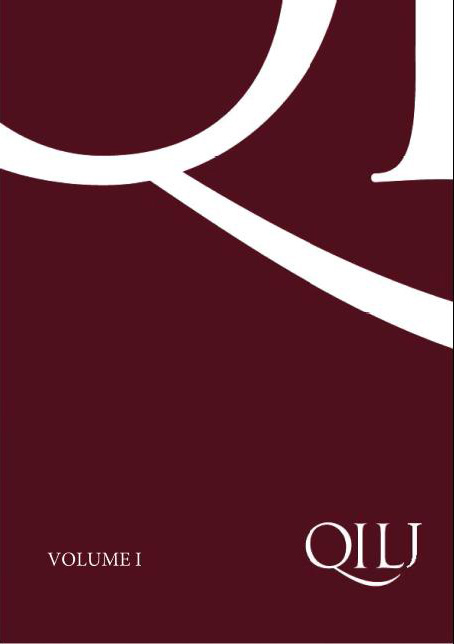
TABLE OF CONTENTS
Volume 1 – 2014
Scarica il QILJ vol 1_2014.pdf
Part I. ZOOM OUT
The Question:
International law and the ‘Crimean conundrum’: Legal issues arising from the 2014 Russia/Ukraine crisis Introduced by Maurizio Arcari and Marco Roscini 1
Antonello TANCREDI
The Russian annexation of the Crimea: Questions relating to the use of force 4
Enrico MILANO
The non-recognition of Russia’s annexation of Crimea: Three different legal approaches and one unanswered question 34
Anne LAGERWALL
L’agression et l’annexion de la Crimée par la Fédération de Russie: quels enseignements au sujet du droit international? 55
The Question:
Colliding legal systems or balancing of values? International customary law on State immunity vs fundamental constitutional principles in the Italian Constitutional Court decision no 238/2014 Introduced by Maurizio Arcari 69
Robert KOLB
The relationship between the international and the municipal legal order: Reflections on the decision no 238/2014 of the Italian Constitutional Court 72
Pasquale DE SENA
The judgment of the Italian Constitutional Court on State immunity in cases of serious violations of human rights or humanitarian law: A tenta-tive analysis under international law 84
Cesare PINELLI
Decision no 238/2014 of the Constitutional Court: Between undue fiction and respect for constitutional principles 99
Paolo PALCHETTI
Judgment no 238/2014 of the Italian Constitutional Court: In search of a way out 108
II TABLE OF CONTENTS
Part II. ZOOM IN
The Question:
Effective control over UN troops and dual attribution of their conduct Introduced by Francesco Messineo and Paolo Palchetti 114
Luigi CONDORELLI
De la responsabilité internationale de l’ONU et/ou de l’Etat d’envoi lors d’actions de Forces de Maintien de la Paix : l’écheveau de l’attribution (double ?) devant le juge néerlandais 116
Pierre D’ARGENT
State organs placed at the disposal of the UN, effective control, wrongful abstention and dual attribution of conduct 129
Andrea SPAGNOLO
The ‘reciprocal’ approach in article 7 ARIO: A reply to Pierre d’Argent 144
The Question:
Unilateral withdrawal from treaties with the intent to avoid supervisory mechanisms: is it in keeping with the principle of good faith? Introduced by Beatrice I. Bonafé and Micaela Frulli 153
Tom COPPEN
Good faith and withdrawal from the Non-Proliferation Treaty 154
Timothy MEYER
Good faith, withdrawal, and the judicialization of international politics 167
Deborah RUSSO
Procedural obligations and good faith: The case of the human rights treaties 184
The Question:
Is the concept of aiding and abetting international crimes leading to the ‘fragmentation’ of International Criminal Law? Introduced by Emanuele Cimiotta and Micaela Frulli 194
Guido ACQUAVIVA
Aiding and abetting international crimes and the value of judicial consistency: Reflections prompted by the Perisic, Taylor and Sainovic verdicts 196
Dov JACOBS
The mythical unities of International Criminal Law: Some thoughts on Perisic, Taylor and Sainovic 215
TABLE OF CONTENTS III
The Question:
The latest (and hopefully) boat tragedy. Is there a right to be rescued at sea? Introduced by Andrea Caligiuri and Irini Papanicolopulu 232
Seline TREVISANUT
Is there a right to be rescued at sea? A constructive view 234
Efthymios D. PAPASTAVRIDIS
Is there a right to be rescued at sea? A skeptical view 247
The Question:
Is there a gap between principles and practices in using the ECHR to set limits to States’ discretion in the management of migration flows? Introduced by Francesca De Vittor and Cesare Pitea 263
Andrea SACCUCCI
The protection from removal to unsafe countries under the ECHR: Not all that glitters is gold 265
Emanuele NICOSIA
Massive immigration flows management in Italy between the fight against illegal immigration and human rights protection 287
The Question:
Shifting from Article 103 UN Charter to ‘equivalent protection’. The Al-Dulimi case before the European Court of Human Rights Introduced by Antonello Tancredi 304
Maura MARCHEGIANI
Le principe de la protection équivalente dans l’articulation des rapports entre ordre juridique des NU et CEDH après l’arrêt Al-Dulimi 306
Gianluigi PALOMBELLA
The principles, and winding, road to Al-Dulimi. Interpreting the interpreters 318
Maurizio ARCARI
Forgetting Article 103 of the UN Charter? Some perplexities on ‘equiva-lent protection’ after Al-Dulimi 331
The Question:
A human right to conscientious objection to same-sex unions? Introduced by Silvia Borelli and Chiara Vitucci 342
Michel MIAILLE
Désobeir la loi? La clause de conscience et le marriage pour tous 345
IV TABLE OF CONTENTS
Ryan HILL
Non-discrimination on grounds of sexual orientation: should the law ac-cord exemptions on the basis of freedom of conscience? 353
Ilaria BERTINI
Conscientious objection to same-sex unions as a reasonable accommoda-tion 367
The Question:
Parallel treaties, (un)parallel commitments? The struggle between uni-versalism and regionalism in international water law Introduced by Maurizio Arcari and Enrico Milano 376
Alistair RIEU-CLARKE
A cure or a course? Entry into force of the UN Watercourses Convention and the global opening of the UNECE Water Convention 378
Attila TANZI
Comparing the 1992 UNECE Helsinki Water convention with the 1997 UN New York Convention on international watercourses : Harmonization over conflict 393
The Question:
Regulatory autonomy and liberalization of trade and investment flows: How are these competing interests balanced by international economic law? Introduced by Giovanna Adinolfi, Claudio Dordi and Tarcisio Gazzini 408
Arthur E. APPLETON
PIL and IEL: Will seal deaths resurrect the dream of international legal coherence? 411
Lorenzo COTULA
Do investment treaties unduly constrain regulatory space? 425
The Question:
The Security Council as a global ‘health-keeper’? Resolution 2177 (2014) and Ebola as a threat to the peace Introduced by Maurizio Arcari and Paolo Palchetti 438
Louis BALMOND
Le Conseil de sécurité et la crise d’Ebola: entre gestion de la paix et pilo-tage de la gouvernance globale 441
Gian Luca BURCI
Ebola, the Security Council and the securitization of public health 462
